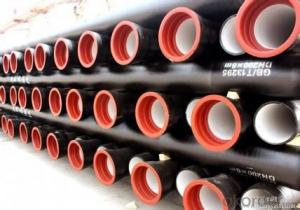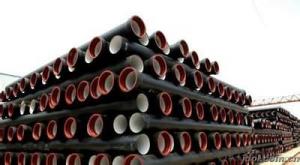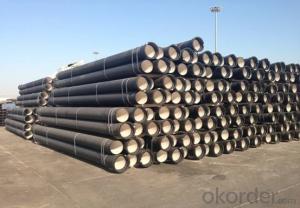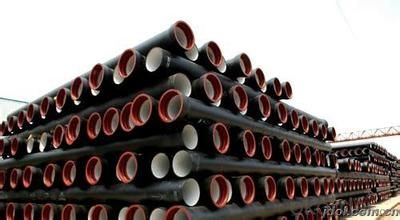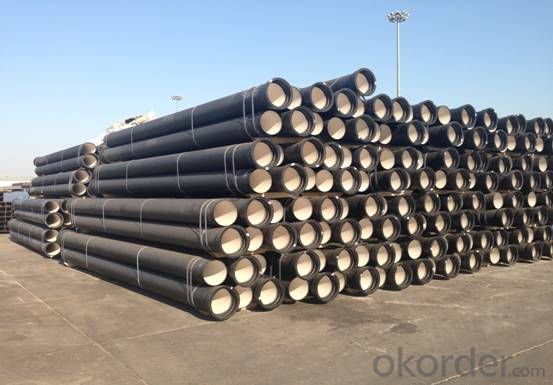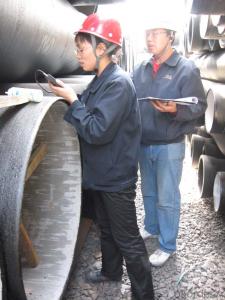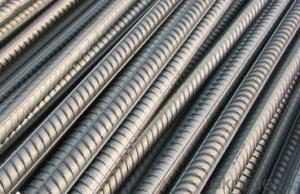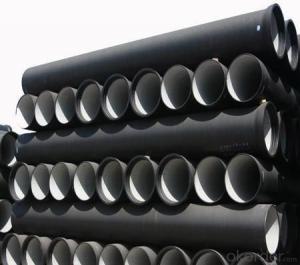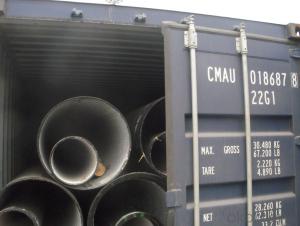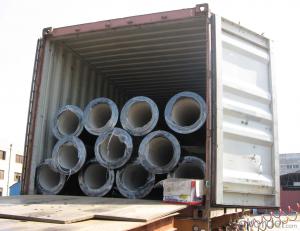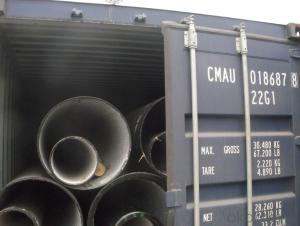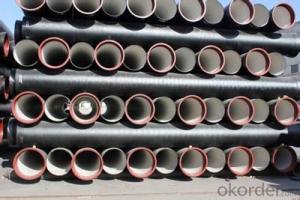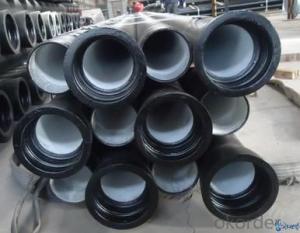DUCTILE IRON PIPE C Class DN900
- Loading Port:
- China Main Port
- Payment Terms:
- TT OR LC
- Min Order Qty:
- -
- Supply Capability:
- -
OKorder Service Pledge
OKorder Financial Service
You Might Also Like
Ductile Iron Cast Pipe is without any defects compare with tradition casting tech, which has many advantages particularly as follow:
(1) High density. In the "vertical upward casting" process, the melt iron of centre liquid column in center crystallizer is continuously feeding for volume shrinkage caused by condensation tube at outer circumference , which lead to be free of shrinkage porosity.
(2) High purity. When melt iron pouring, the mixed impurities such as gas, dross, sand grain which are lighter than melt iron could be eliminated at furnace mouth, its impossible to enter into the crystallizer through the channel, so the melt iron into the crystallizer is very pure.
(3) Strength with toughness. The cooling speed provided by continuous crystallizer is 30 times than sand casting and 5 times than centrifugal casting, and doesn't produce white iron, the eutectic cell volume of continuous cast iron is one eighth to one tenth compare with traditional cast iron. The density of graphite nodule in ductile iron can reach 300-700 pcs/mm2. Therefore, all reason above improve the strength and toughness of continuous cast iron.
(4) Free machining. The high speed cooling make the hardening phase (such as boride, steadite) not appear like reticular, massive or thick, but diffuse like fish bone and pane in shape, moreover, there are tiny graphite flakes inlaid hardening phase. It's free machining in BrinellHardness the range of 250-300HB. However, the Brinell Hardness of 250 is top limit to common metal materials.
(5) Uniform composition of tube wall. The convection mixing of liquid column caused by marching type drawing in crystallizer make the composition of tube wall well-distributed, and concentration gradient very little.
(6) High productivity. To the wall thickness of tube under 10mm, the speed of continuous casting is 1 meter/min, to the wall thickness of tube under 20mm, the speed of continuous casting is 0.5 meter/min, which is high efficiency that centrifugal or other casting tech couldn't reach.
- Q: Are ductile iron pipes suitable for pressure reducing valve stations?
- Yes, ductile iron pipes are suitable for pressure reducing valve stations. Ductile iron pipes have excellent strength and durability, making them capable of withstanding high pressure conditions. They also have good corrosion resistance, which is essential for long-term reliability in a pressure reducing valve station.
- Q: Can ductile iron pipes be used for underground parking lot drainage?
- Ductile iron pipes are indeed suitable for drainage in underground parking lots. This robust material is frequently utilized in underground piping systems due to its strength and durability. It exhibits exceptional resistance to corrosion, making it an ideal choice for situations where the pipes will come into contact with moisture and water. Furthermore, ductile iron pipes possess considerable tensile strength, enabling them to bear heavy loads and endure the pressure exerted by vehicles in a parking lot. Consequently, opting for ductile iron pipes for underground parking lot drainage ensures a dependable and enduring solution.
- Q: Can ductile iron pipes be used for underground irrigation systems?
- Yes, ductile iron pipes can be used for underground irrigation systems. Ductile iron pipes are commonly used in various applications, including water supply and distribution systems. They are known for their strength, durability, and resistance to corrosion, making them suitable for underground installations. Additionally, ductile iron pipes have excellent pressure-bearing capacity and can withstand the high pressures often required for irrigation systems. However, it is important to ensure proper installation and maintenance to prevent any damage or leaks in the system.
- Q: Can ductile iron pipes be used for both water and sewage systems?
- Yes, ductile iron pipes can be used for both water and sewage systems. Ductile iron pipes are known for their strength and durability, making them suitable for various applications. They have excellent resistance to corrosion and can withstand high pressures, making them ideal for transporting both water and sewage.
- Q: Is the spigot and socket connection of the ductile iron tube reversed?
- The whole process is formed by the radial compression of the pipe blank and the stretching process of the branch pipe. Different from the hydraulic bulging three, the metal of the three way joint pipe is compensated by the radial movement of the tube blank, so it is also called radial compensation process.
- Q: Can ductile iron pipe be used for marine and offshore applications?
- Ductile iron pipe is suitable for marine and offshore applications due to its high strength and durability. It is well-known for its ability to withstand demanding environments and is particularly resistant to corrosion, including the corrosive effects of saltwater and harsh marine conditions. Moreover, its ductility allows for flexibility and resistance to cracking or fracturing under high-pressure conditions. These exceptional properties make ductile iron pipe a dependable choice for transporting fluids and gases in marine and offshore industries, such as offshore oil and gas platforms, marine structures, and underwater pipelines. To further enhance the corrosion resistance of ductile iron pipes in marine and offshore applications, it is essential to utilize proper coating and cathodic protection systems.
- Q: What are the different lining materials available for ductile iron pipe?
- There are several different lining materials available for ductile iron pipes. These linings are used to protect the pipe from corrosion and extend its lifespan. Some common lining materials include: 1. Cement Mortar Lining: This lining consists of a layer of cement mortar applied to the interior surface of the pipe. It provides a smooth and durable barrier against corrosion and is commonly used in water and wastewater applications. 2. Polyethylene Encasement: Polyethylene encasement involves wrapping the pipe with a layer of polyethylene film. This lining provides excellent corrosion protection and is often used in aggressive soil conditions. 3. Polyurethane Lining: Polyurethane lining is a spray-applied material that forms a seamless and flexible barrier inside the pipe. It offers superior resistance to chemicals and abrasion, making it suitable for applications involving aggressive fluids. 4. Epoxy Lining: Epoxy lining is a popular choice for lining ductile iron pipes, as it provides excellent resistance to corrosion and chemicals. It is typically applied as a liquid coating that cures to form a smooth and protective layer. 5. Zinc Coating: Zinc coating, also known as galvanizing, involves applying a layer of zinc to the exterior surface of the pipe. This lining provides corrosion resistance and is commonly used in outdoor and exposed applications. These lining materials offer different advantages and are chosen based on the specific needs of the application. Factors such as the type of fluid being transported, environmental conditions, and expected service life are considered when selecting the most suitable lining material for ductile iron pipes.
- Q: Are ductile iron pipes resistant to frost heave?
- Yes, ductile iron pipes are generally resistant to frost heave due to their strong and flexible nature.
- Q: Are ductile iron pipes suitable for use in oil refineries?
- Yes, ductile iron pipes are suitable for use in oil refineries. Ductile iron is a type of cast iron that offers a unique combination of strength, durability, and flexibility, making it an excellent choice for various applications, including oil refineries. One of the key advantages of ductile iron pipes is their high tensile strength, allowing them to withstand the high pressure and stress commonly found in oil refining processes. This strength is crucial for the transportation of various fluids, including crude oil, refined petroleum products, and chemicals within the refinery. Additionally, ductile iron pipes have excellent corrosion resistance properties, making them highly resistant to the corrosive effects of oil, chemicals, and other substances typically present in oil refineries. This corrosion resistance ensures the longevity and reliability of the pipes, reducing the need for frequent maintenance and replacement. Furthermore, ductile iron pipes have exceptional ductility, which means they can absorb and withstand significant impacts and vibrations without fracturing or breaking. This quality is advantageous in oil refineries where there may be frequent movement or potential stressors due to machinery, equipment, or ground settlement. Moreover, ductile iron pipes have a smooth interior surface that reduces friction, allowing for efficient fluid flow and minimizing pressure loss. This characteristic is essential in oil refineries, as it helps optimize the transportation of fluids, ensuring a smooth and reliable production process. In conclusion, ductile iron pipes are suitable for use in oil refineries due to their high tensile strength, corrosion resistance, ductility, and smooth interior surface. These pipes provide a reliable and durable solution for transporting various fluids within the refinery, contributing to the efficient and safe operation of oil refining processes.
- Q: Are ductile iron pipes suitable for water distribution networks?
- Ductile iron pipes are a suitable choice for water distribution networks. They have been widely used in water distribution systems for many years, thanks to their numerous advantages. To begin with, ductile iron pipes possess excellent durability and a long lifespan. Their resistance to corrosion is crucial for water pipes since they are continuously exposed to various chemicals and substances in the water. This corrosion resistance ensures that the pipes maintain their structural integrity over time, reducing the frequency of repairs or replacements. Furthermore, ductile iron pipes have a high strength and can withstand high pressure, making them ideal for water distribution networks. They can handle heavy loads and resist external forces such as soil movement or traffic loads, guaranteeing the safety and reliability of the water supply. Moreover, ductile iron pipes exhibit excellent hydraulic properties. With their smooth internal surfaces, they minimize friction and pressure drop, enabling the efficient flow of water through the system. This aids in conserving energy and reducing pumping costs, making ductile iron pipes a cost-effective choice for water distribution networks. Additionally, ductile iron pipes are versatile and can be easily installed in various soil conditions. They can endure ground movement and settle without breaking, which is crucial for maintaining a stable water distribution system. In conclusion, ductile iron pipes are highly suitable for water distribution networks due to their durability, resistance to corrosion, high strength, excellent hydraulic properties, and versatility in installation. They offer a reliable and efficient solution for delivering safe and clean water to communities.
Send your message to us
DUCTILE IRON PIPE C Class DN900
- Loading Port:
- China Main Port
- Payment Terms:
- TT OR LC
- Min Order Qty:
- -
- Supply Capability:
- -
OKorder Service Pledge
OKorder Financial Service
Similar products
Hot products
Hot Searches
Related keywords
